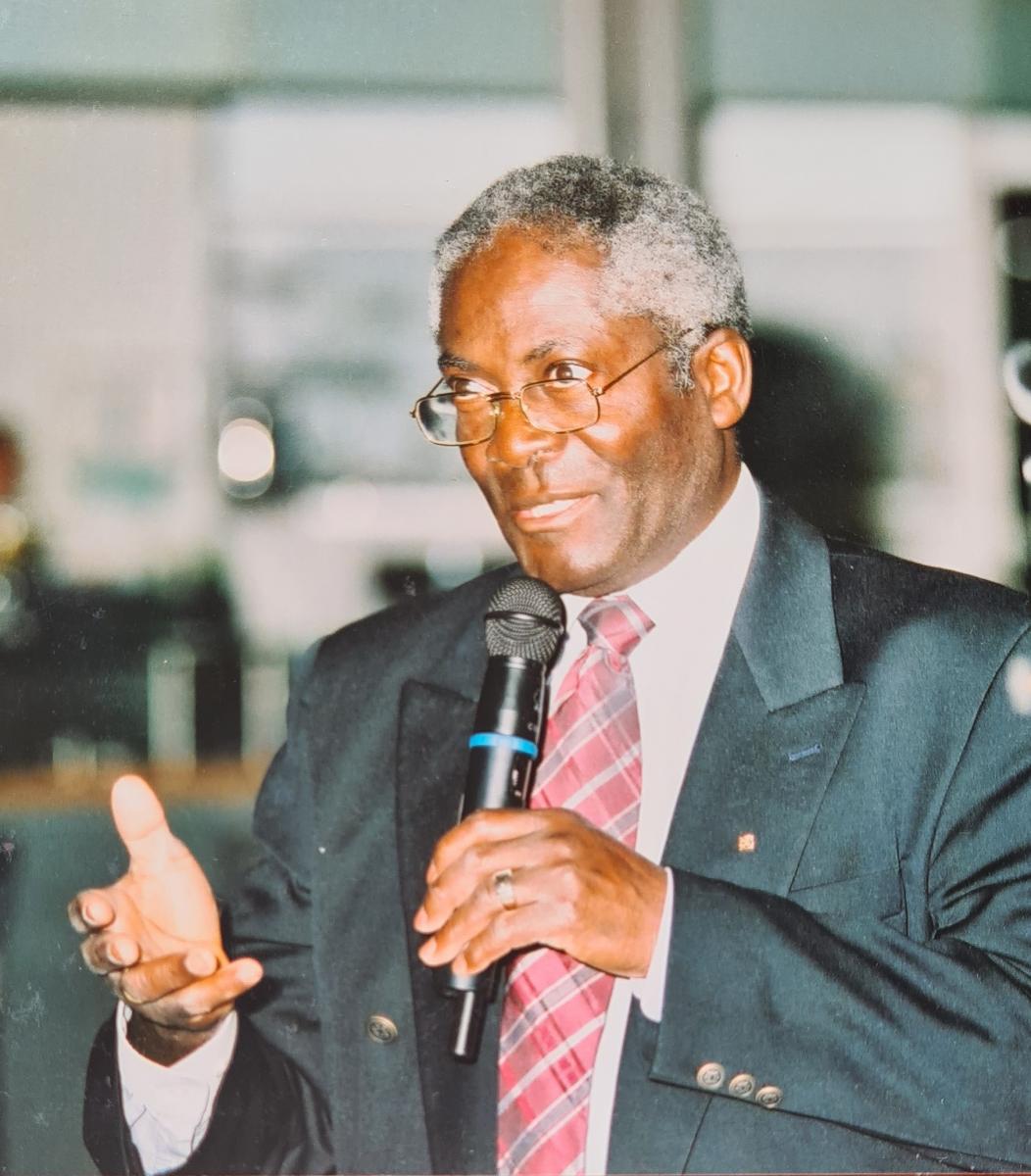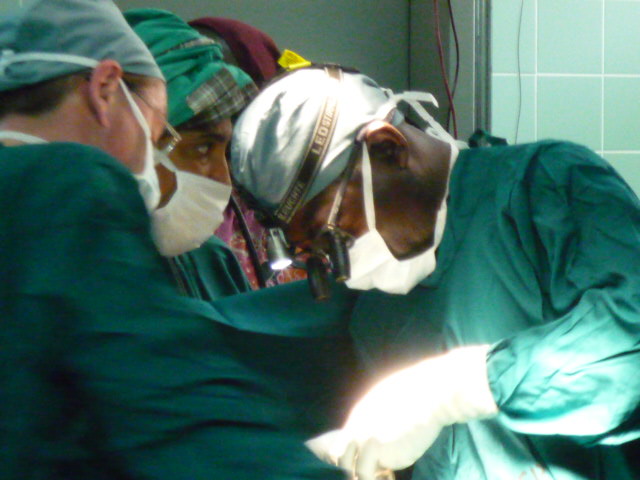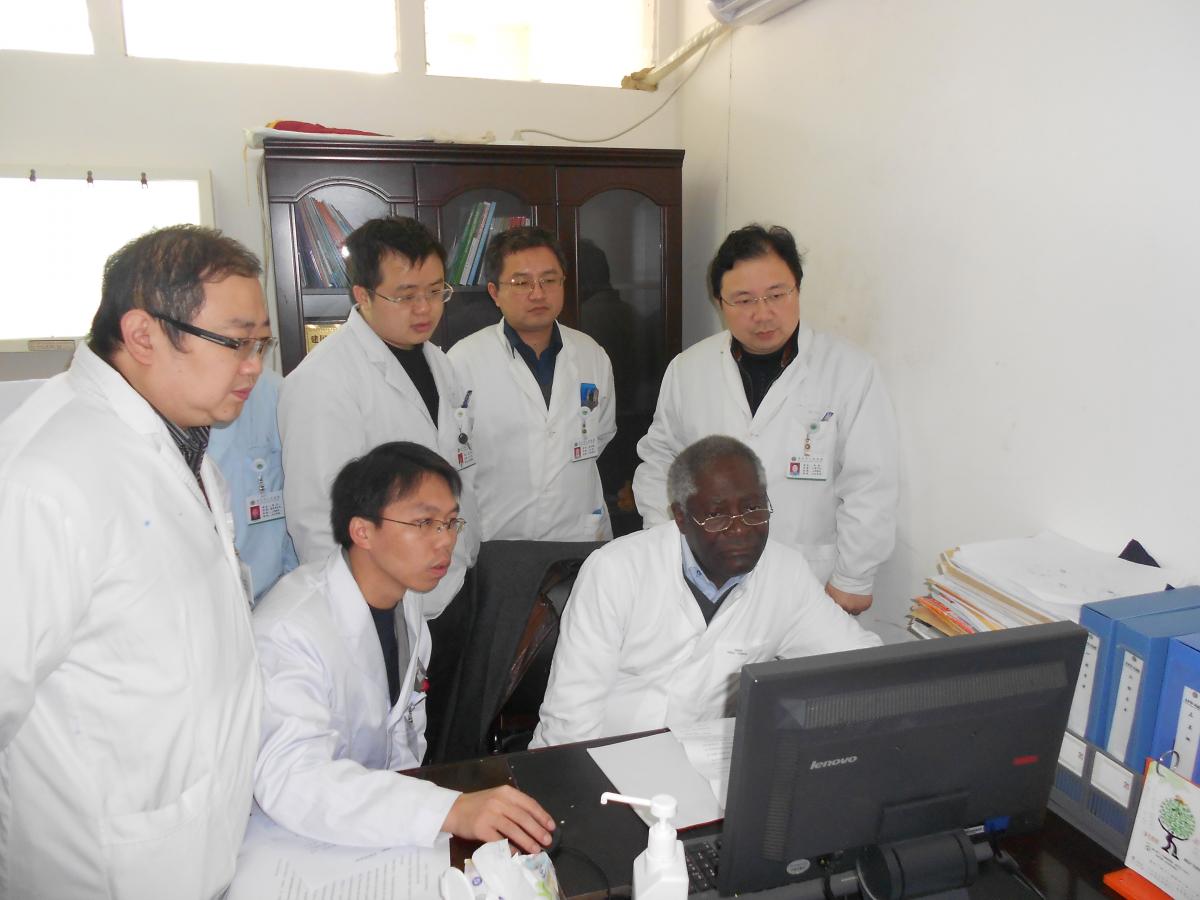ALERT!
This site is not optimized for Internet Explorer 8 (or older).
Please upgrade to a newer version of Internet Explorer or use an alternate browser such as Chrome or Firefox.
Global Surgeon Spotlight: Prof. Charles Yankah
 Professor Charles Yankah has dedicated the last fifty years to advancing cardiovascular care and helping the globally underserved communities who require it.
Professor Charles Yankah has dedicated the last fifty years to advancing cardiovascular care and helping the globally underserved communities who require it.
Since his retirement from cardiothoracic and vascular surgery at the German Heart Center Berlin in 2012, Prof. Yankah has continued his global career in cardiovascular medicine as a consultant to the governments of Rwanda and Tanzania, educator, and philanthropist with the goal to promote cardiovascular educational programs throughout Africa. From 2012-2014 he expanded his educational programs to China. He became a consultant of Senior Expert Service (SES) of German Industries for transfer of knowledge in cardiovascular surgery in China.
Prof. Yankah’s career began in Hungary and Germany, where he obtained his medical training from 1962 to 1969. After his training in cardiovascular surgery, he worked as a cardiovascular surgeon and consultant across Europe and in Liberia, where he performed the first juvenile rheumatic mitral digital valvotomy in 1980. The same year, he returned to Germany, where he established a homograft bank, cofounded the German Heart Centre Berlin, earned his PhD and title of professor of surgery at the Free University and Humboldt University Berlin, respectively, and began teaching surgery. His clinical work and research in valve disease, cardiomyopathy, heart transplantation, and immunology of homograft valve surgery earned him an award from the National Institute of Health.
In 2004, Prof. Yankah began his work in philanthropy in Africa with his South African colleague Dr. Willie Koen. He organized the African Heart Seminar, now PASCaTS, in collaboration with the Global Development Learning Network through an initiative with the World Bank aimed at encouraging the transfer of knowledge and sharing of clinical experiences within the context of development cooperation in Africa. Now, he serves as president of the Pan-African Society for Cardiothoracic Surgery and is the founder of Global Heart Care, an organization whose mission is to enhance capacity-building programs in Africa.
Read the interview below to learn more about Prof. Yankah and his role as an advocate for cardiothoracic surgery in underserved regions. The conversation has been edited for length and clarity.
CTSNet: Can you tell us about your pivotal role in the history of the Pan-African Society for Cardio-Thoracic Surgery (PASCaTS)?
Prof. Yankah: The predecessor organization of PASCaTS was African Heart Seminar (AHS), which I initiated in 2004 in my capacity with the German Heart Centre Berlin along with Dr. Willie Koen at the Christiaan Barnard Memorial Hospital in Cape Town. This was following the successful start-up of an artificial heart program for bridge-to-heart transplantation using the “Berlin Heart” device. The aim was to promote echocardiographic training and cardiovascular educational programs on the African continent.
It developed into a continental outreach program supported by my esteemed colleagues from around the world, Dr. Carlos Mestres, Prof. Francis Smit, Dr. Francis Fynn-Thompson, Prof. Michael Weyand, Dr. Lale Hakami. In 2011, we decided to change the name to Pan-African Cardiothoracic Society. The mission of the organization is to represent the professional interests of all cardiothoracic surgeons in diaspora and on the continent, promote echocardiographic and cardiac surgical educational programs (Global Heart Forum), deliver cardiac surgical services to the underserved, and create more awareness of emerging cardiovascular disease in the regions in Africa where cardiovascular health care is underdeveloped.

CTSNet: How is PASCaTS unique from other cardiothoracic societies and how did partnership with the European Association for Cardio-Thoracic Surgery develop?
Prof. Yankah: Pan-African Society for Cardiothoracic Surgery (PASCaTS) brings together active individual cardiothoracic surgeons practicing in Africa, the diaspora, and the international community who contribute to cardiothoracic surgical practice and science to share their knowledge with the local teams and health authorities. The principal belief that drove the organization’s founding is that the full potential of cardiovascular medical missions to Africa and diaspora had never been fully realized.
The partnership with EACTS was initiated in 2012 by me and Professor Pieter Kappetein, secretary general of EACTS at the time, during the annual meeting in Barcelona to organize joint sessions and the EACTS annual meeting to promote cardiothoracic surgical education in developing countries in Africa. The key aims of the EACTS-PASCaTS partnership are to promote cardiothoracic surgical education, practice, research, and networking among cardiovascular physicians in Africa and in diaspora. Unfortunately, the partnership with AATS initiated by Prof. Craig Smith, President of AATS in 2012, was not supported by the succeeding presidents.
CTSNet: In your opinion, which of your many contributions to the education and progression of colleagues and programs in Africa has achieved the greatest impact?
Prof. Yankah: Our AfriCaTS database (2021) documented that 70 percent of cases of rheumatic heart disease involve only the mitral valve, and 25 percent of cases involve both the aortic and mitral valves. The 2012 PASCaTS survey that revealed only 10 percent repair of mitral valve procedures in sub-Saharan Africa (SSA) was published in JTCV Surgeon in 2014. Our continuing educational programs to promote repair of juvenile rheumatic mitral valve disease have encouraged surgeons to learn and practice this surgical technique to enable rheumatic children to grow without anticoagulation. The acceptance of the juvenile rheumatic mitral valve repair has been demonstrated by PASCaTS survey (AfriCaTS database) in 2021, revealing 30 percent repair mitral valve procedures (Nigerian JCVS 2022).
The Global Heart Forum-PASCaTS webinar has really grown as a pure outreach project in Africa and has become a Pan-African cardiovascular healthcare project since the COVID-19 pandemic in 2020.
CTSNet: Did you ever consider returning to Ghana to practice full-time? How would you council an African mentee who came to Europe / UK to train and wanted to return home to practice?
Prof. Yankah: Practicing as a full-time CV surgeon in Ghana was not my ambition because of lack of political interest and support for developing a sustainable cardiovascular program. I was in Liberia in 1979–80 to set up a cardiothoracic center in Monrovia where I performed the first closed rheumatic mitral valvotomy in a fourteen-year-old girl. The political coup d’état drove me out of the country and back to Germany.
Currently, there are ten cardiothoracic surgeons in Ghana. Nine are practicing at the Accra heart center and one at Kumasi CV unit, struggling to operate 120 open heart surgeries a year either because of lack of tertiary healthcare insurance system to cover heart operations or because of the complexity of the cases beyond their expertise. Patients with complex cases who can afford travel to India do so, while the impoverished patients are treated conservatively at home.
My plan is to set up a high-volume regional hub in West Africa for a population of 400 million (African Heart Centre) in collaboration with the German Heart Centre and two European/US centers to absorb all Africans in diaspora who wish to come back to their roots to work with expatriate teams on rotation with the local teams at a modern and standardized facility with efficiency and working comfort. The concept aims at integrating the visiting heart teams into the clinical and training programs. I am working on this project, which should include health insurance model to realize the project.
CTSNet: What is the biggest challenge facing cardiothoracic surgery in Africa right now?
Prof. Yankah: An effective health insurance system to cover impoverished patients. There is currently an inability of the national governments to allocate adequate budget for cardiovascular medicine, sadly even for a universal coverage of child healthcare.
CTSNet: What is the biggest advance you’ve seen in cardiothoracic surgery in Africa lately?
Prof. Yankah: The rate of repair of juvenile rheumatic mitral valve disease has improved since 2012 from 10 percent to 30 percent with low incidence of reoperation at the recent studies of PASCaTS. The strategic approach for repair of complex congenital defects such as AVSD, tetralogy of Fallot has been standardized with good results. CABG surgery is on the rise approaching 7–10 percent with learning curves. The rate of CABG surgery at the time PASCaTS studies in 2012 was 5 percent.
CTSNet: If you had a magic wand to change one thing in healthcare and/or CT surgery in Africa tomorrow, what would it be?
Prof. Yankah: I have a few, actually: Universal cardiovascular health care coverage with a health insurance model, especially for children. Low-budget cardiac surgery (in which consumables can be reused, bloodless surgery, etc.). Regular cardiovascular surgery skill simulation courses in every subregion in Africa, preferably at low-volume centers (congenital heart and valve surgical procedures, CABG surgery and Type A dissections). And finally, to change the mindset of the younger generation surgeons to be vigilant and responsible for maintenance of electronic devices and complete digital documentation.
CTSNet: What is the most important thing about health disparities in low- and middle-income countries that you wished more people in high-income countries knew/understood?
Prof. Yankah: A global health insurance model driven by NGOs and contributions of Africans in diaspora toward community health insurance model can minimize health disparities in low-and middle-income countries. It will bridge the gap until economic stability is achieved by the national governments, and universal health coverage becomes affordable.
CTSNet: In your opinion, how can we best or most efficiently effect change in the health disparities faced by low- and middle-income countries?
Prof. Yankah: Diaspora-based community health insurance driven by monthly remittances to their families. This action will encourage civilians, industries, and philanthropists of the global north to contribute (e.g. 5 USD per month). This is a temporary health insurance model that would be facilitated by NGOs to support the healthcare of the global south.
CTSNet: How important is the international exchange of ideas, information, and techniques in cardiothoracic surgery?
Prof. Yankah: This is a very important and good question. Our humanitarian operations in cardiothoracic surgery comprises of transfer of know-how and sharing knowledge with the underserved communities. Communication is the key to education. Education provides more information to understand techniques and improve skills in cardiothoracic surgery. Communication, education, and information are indispensable for regular maintenance of electronics and machines in developing countries. The word “maintenance” does not exist in many cultures. At least, it’s nonexistent in African languages. Therefore, only continuing education can be used to achieve efficiency in clinical and technical services.






Comments